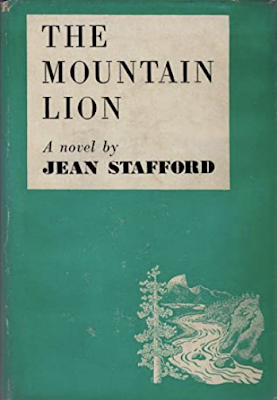 |
| Detail of "The Shower" by William Herbert Dunton. The original is in the American Museum of Western Art in Denver, Colorado |
The Mountain Lion is one of several unread NYRB Classics that have been accumulating on my TBR shelves. I've probably owned it for a good ten years and it seemed like a good choice for the TBR Pile Challenge. I try to mix up my reading with different genres and it seemed quite different than my previous read, plus it's short -- a good choice when I'm behind on my annual reading goal already! However, this book was nothing like I expected.
Published in 1947 but set about 20 years earlier, it is the story of a young brother and sister living in California, Ralph and Molly Fawcett. The book begins when Ralph, aged ten and Molly, eight, are anxiously awaiting the arrival of their Grandfather Kenyon, the stepfather of their widowed mother (so, technically, their step-grandfather). They live with their mother and two older sisters in a walnut grove in suburban Los Angeles, and their Grandfather's visit is the highlight of the year. Grandpa Kenyon is quite a character, a world traveler who owns various properties including a ranch in Colorado, managed by his son Claude, their mother's half-brother.
Ralph in particular is stifled growing up among a lot of females, but ostensibly for their health, Ralph and Molly begin to spend extended trips on the ranch with Claude. Ralph's world changes as he leaves his repressed childhood in California to a heavenly freedom in Colorado, where he learns to ride and shoot and fish.
 |
| The original 1947 cover. I love the illustration, like a reverse woodblock print. |
This seems like it could be a wonderful and ideal way to spend summers, but it's not ideal for Molly, who is precious, awkward, and bookish. It also takes a rather darker turn as they begin to grow older. What at first appears idyllic is actually not. Jean Stafford is masterful at describing life, both on the ranch and in California, but she doesn't leave out any details, including butchering animals and a really grotesque incident of self-harm. The characters are really well-drawn, but none of them are particularly likable; however, I absolutely had to keep reading to the ending which left me gobsmacked and very unsettled. My edition had a forward by Stafford with a major spoiler so I should have seen it coming -- I was still rather shocked but if you want to be completely surprised, I'd skip it.
Having read the forward, I had an overwhelming sense of dread. It actually reminded me a bit of the film The Power of the Dog, -- not so much the plot, but they're both Westerns set in the 1920s with dark undertones. I actually saw it the theater a few months ago and it's a great movie but it made me deeply uncomfortable because I knew something dreadful was going to happen. If that is the type of story that puts you off, I would probably not read The Mountain Lion. I gave it four stars on Goodreads (there is some racism besides the disturbing parts) but I don't think I would read it again.
 |
| From the 1983 edition. This cover is SO 1980s! |
Jean Stafford won the Pulitzer Prize in 1970 for her Collected Short Stories, and a couple of other novels. I'm not sure if they're as dark as The Mountain Lion but her writing is very good and at some point after I've recovered from this one I might look for them later.
This is my fifth book for the TBR Pile Challenge.
I think it is wrong for the forward to contain spoilers. I suppose sometimes it is hard to discuss the book without, but in that case it should be an afterward!
ReplyDeleteI haven't read Jean Stafford and wondered how she became a "classic author" so I am glad you reminded me it probably resulted from her short stories.
"There was a more general consensus about Miss Stafford's next book, “The Mountain Lion,” an allegorical tale set in the high country of Colorado, where she had lived for many years. The prose was in startling contrast to that of the earlier novel: lean and sinewy. The landscape was austere and chill, light years away from that of urban New England."
https://www.nytimes.com/1979/03/28/archives/jean-stafford-63-writer-dead-collected-stories-won-pulitzer.html
I love the story about fighting with Con Ed - it is exactly what I would do!
Constance
That story about Con Ed is HILARIOUS, thank you for the link! I may reconsider and look for her short stories on the strength of this anecdote alone.
Delete